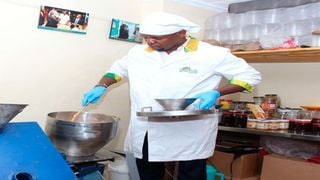
Samuel Barakah at his business premises in Buruburu, Nairobi.
| Richard Maosi | Nation Media GroupSeeds of Gold
Premium
Nuts change fortunes of rugby player Samuel Barakah
On the east of Nairobi is Buruburu, an expansive settlement that is struggling to live up to its initial dream – a serene middle-class estate.
Highrise residential buildings are fast replacing bungalows and maisonettes constructed many decades ago.
As one traverses the estate, it becomes apparent that the bungalows and maisonettes are losing the battle, thanks to a rapidly growing population.
Not far from the Buruburu Shopping Centre, the Seeds of Gold team meets Samuel Barakah, 45.
He is the founder of Natural Barakah, a start-up that makes peanut butter products.
Barakah makes four varieties of peanut products – roasted butter plain, butter mixed with sesame, butter mixed with cashew nut and butter mixed with sesame, cashew nuts and flaxseed.
“I also make products from jaggery and honey,” says the entrepreneur, who adds that his products are certified by the Kenya Bureau of Standards (Kebs).
Barakah says his journey into value addition started when he was a Nondescripts Rugby Football Club player.
“While playing rugby, I started researching on products that can be used as bread-spread but with a longer shelf-life and which could also be used to cure soft tissue injuries in athletes, children and lactating mothers,” he says.
He realised peanut could be blended with many products, including flaxseed which has omega 3 fatty oils and helps develop infant brains.
He later stopped playing rugby to work as a credit controller at a security company in Nairobi.
Entrepreneurship journey
Having been brought up in Kakamega, one of the counties that produces nuts, he began adding value to peanuts assisted by his parents in 2016.
That was the beginning of his entrepreneurship journey.
Barakah’s parents assisted him get raw materials from farmers. He picked most of his lessons online.
In 2017, Barakah enrolled for a value addition course at Kenya Industrial Research and Development Institute (Kirdi).
“This took me about two years. After the course, I was incubated at Kirdi but moved out to grow my business in 2017. I had Sh250,000 in savings,” he says.
He bought a blender for peanut butter processing, a sheller to remove the outer skin, a roasting machine and other equipment.
“I get groundnuts from Mumias, flaxseed from Nairobi at Sh450 a kilogramme and cashewnuts from Kenya Nuts Ltd,” says Barakah, who operates his business from rented premises.
He dries the nuts again after purchase to ensure they are aflatoxin-free.
Barakah works with contracted farmers who supply organic produce.
“I buy 300-350 kilograms of nuts every month and process 250 kilos,” he says.
To make peanut butter mixed with cashew nuts, sesame and flaxseeds, he starts by weighing them separately.
Barakah then mixes the cashews with peanuts then grinds the mixture, adds salt and sesame and finally the flaxseed. The grounding continues.
Hygiene is important in this business, he says, adding that besides ensuring his two employees are always in protective gear like gloves, helmets and dust coats, they must undergo food-handling tests every six months.
“The smallest package produced here is 420 grams. That quantity of plain peanut butter goes for Sh450. The same quantity of peanut butter mixed with sesame sells for Sh600 while peanut butter mixed with cashew nuts costs Sh600,” he says.
“Peanut butter mixed with cashew nuts, sesame and flaxseed goes for Sh1,200.”
He sells the produce to Weston Pharmacy that is directly opposite the City Market in Nairobi’s CBD, nutritional or dietary clinics, lactating mothers and people with diabetes, cancer or hypertension.
Barakah uses Facebook, Twitter, WhatsApp and the online market place Jumia to sell his products.
One of his greatest challenges is the supply of raw materials.
Prices shoot
The supply is not constant throughout the year. When the supply of nuts is low, prices shoot up.
Samuel Nguka, a food security and sustainable specialist with Vixam Agribusiness Consultants, says nuts are susceptible to aflatoxin contamination due to their permeability to gas and moisture.
“To reduce the risk of aflatoxin and avoid post-harvest contamination, the farmer and those buying the dry produce need to store it properly,” Mr Nguka says.
The other challenge with the nuts for those adding value is poor grading and sorting.
That means the entrepreneur ends up with a huge quantity of unwanted nuts.
“During processing, however, one should not remove the skin as it is rich in zinc, iron, calcium, magnesium and aluminium,” he says.
These minerals are responsible for strong bones, a boon for the elderly and expectant women.
According to Barakah, peanut blended with cashewnut offers a balanced meal. Nutritionists say eating peanuts makes one alert.
Sesame, on the other hand, helps repair damaged cells and any deformations in the body.
“Value addition makes the product have a long shelf-life, with the farmer assured of higher earnings,” Nguka says.





